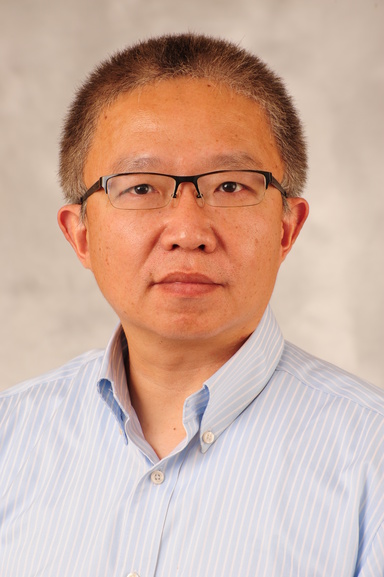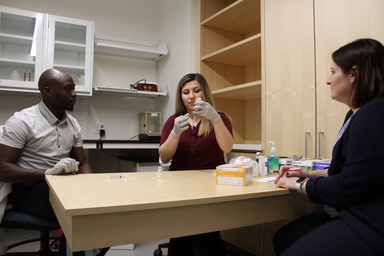Faculty researchers in the University of Iowa College of Pharmacy are drawing upon their unique strengths and expertise to slow or stop the spread of the novel coronavirus that has swept the globe.
Racing to Develop a Vaccine or Cure
Faculty members who practice basic pharmaceutical science—aided by their graduate students and postdoctoral researchers—are part of the race to develop a vaccine or a cure.
Researchers in the laboratory of Professor Rob Kerns are making derivatives of a compound previously made. According to Kerns, the discovery that molecules he is working with have activity against COVID-19 came to light when researchers at Washington University in St. Louis screened compounds for activity against COVID-19. The molecules were doing very well in preclinical evaluation for a different disease. “The compounds were found to be potent inhibitors of COVID-19 infecting cells,” he said.
Professor Zhendong Jin also discovered that a compound developed in his lab—in this case with anticancer properties—is potent against the virus. Jin is collaborating with a renowned Germany-based virologist, Dr. Albrecht von Brunn, in search of a drug therapy to fight COVID-19. “We hope in the near future to advance this compound or its derivative into a clinical trial,” Jin said.
A different approach is being taken in the lab of Professor Kevin Rice. Rice’s lab has been working with Messenger RNA (mRNA) drug delivery systems for roughly five years. mRNA converts DNA information in a person’s body into proteins. Proteins, in turn, “make everything happen,” Rice explained, including, if worked with by scientists, making people immune to COVID-19.
A Massachusetts-based company, Moderna Therapeutics, used mRNA to develop a potential vaccine for COVID-19 that has been proven safe; it has begun the second of three phases of human trials. “A few years ago, we filed a patent through the university for double-stranded mRNA,” Rice said. “We think if this type of mRNA was substituted, it would improve even the lead vaccine with Moderna.”
Rice’s task, now, is to prove that it is stronger and works better.
Associate Professor Ashley Spies has been using computational chemistry approaches to elucidate drug lead compounds that target an essential enzyme of the novel coronavirus, called CLpro. This enzyme is essential for processing the viral protein produced by the virus' RNA genome, and one of the few viral enzymes that can be targeted by small-molecule drugs. After months of computational work directed toward understanding what kinds of molecules may specifically bind to the viral enzyme, Spies' research group is now putting their calculations to the test; they are purifying the enzyme and gearing up for inhibition studies.
Professors in the College of Pharmacy’s Department of Pharmaceutical Sciences and Experimental Therapeutics have been working with the High Throughput Screening Facility to “build up high-throughput screening capacities for COVID-19 related projects,” said Meng Wu. Wu is the director of the core facility of the university, which is housed in the college.

Meng Wu is director of the High Throughput Screening Facility. The core university facility provides screening, project management, grant assistance, and assay/technology development for investigators across campus and beyond.
As a university core facility, UIHTS provides highly flexible screening services, project management, grant assistance, and assay/technology development for investigators across campus and beyond.
Wu explained, “We responded quickly to the needs of UI investigators for COVID-19 related drug discovery projects, by working with external collaborators on repurposing FDA drugs for antiviral treatment of COVID-19. We did so by building up the shared resources (assays, drugs, cells, and BSL2 virus surrogates) in a short time and by actively pursuing access of BSL3 lab and agents, so we can join collaborative efforts to counter COVID-19.”
How is the Pharmacy Community Faring?
Research being done by clinical practice and health services faculty members have also focused on research related to the novel coronavirus.
Associate Dean Mary Ray is among a group from 13 research-oriented institutions evaluating the experience of Doctor of Pharmacy (PharmD) students forced to acutely shift their learning and assessment experience to a virtual environment. Secondary challenges to online learning were noted, such as caregiving or parenting while attending to their studies, being unable to engage in patient-care activities if immunocompromised, loss of income due to sudden unemployment, and mental health effects from additional stress, fears, and concerns. The students’ experiences, collected through questionnaires, are helping pharmacy school leaders prepare students, faculty, and staff to a new normal this fall. Ray served as an author in a Pharmacy Times story discussing the project. A follow-up study is now underway evaluating effects on faculty.

Assistant Professor Matt Witry contextualized findings on pharmacist burnout from the 2019 National Pharmacist Workforce Survey as they relate to COVID 19 for a recent article in Drug Topics entitled: "Experts Examine the Many Factors of Pharmacist Burnout." Witry also is assessing the relationship between how a pharmacy is adjusting for COVID 19 and pharmacist burnout.
Clinical Assistant Professor Brett Faine is a co-investigator and site principal investigator for a project—funded by the Centers for Disease Control and Prevention—called COVID-19 Evaluation of Risk in the Emergency Department. The project seeks to help prevent emergency department personnel from getting the disease by measuring risk factors in 20 national academic medical centers.
Clinical Assistant Professor Laura Knockel is working with faculty from other Big Ten schools to survey their pharmacy schools regarding how pharmacy practice skills were assessed during virtual learning as a result of the pandemic. A manuscript is being prepared to submit to the Journal of the American College of Clinical Pharmacy special issue on clinical pharmacy education.
